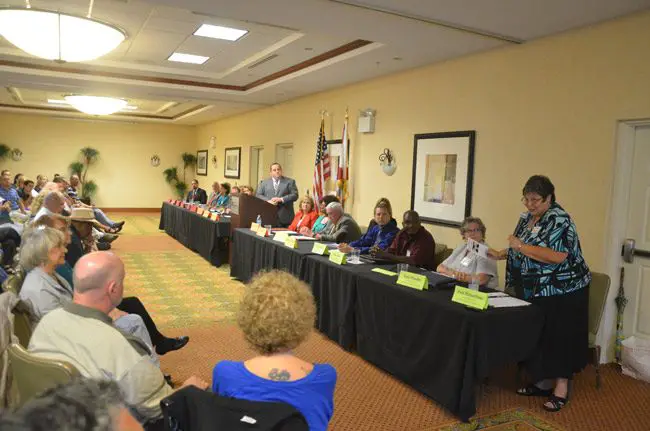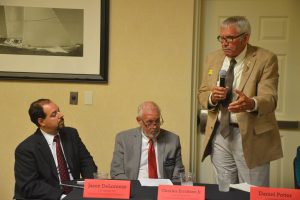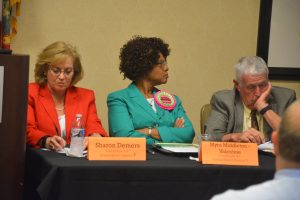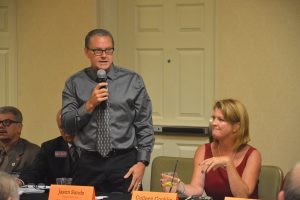
Sixteen candidates turned out Thursday evening for the first election forum hosted by the United Public Employees of Flagler County at the Hilton Garden Inn in Palm Coast. And all 16 lined up along sets of table, facing an audience of about 100 and taking questions sometimes addressed to all 16, sometimes addressed to candidates in particular races.
It was an odd arrangement: never has a local forum featured so many candidates simultaneously, leaving each candidate having to be silent 94 percent of the time for the duration of the 100-minute forum. Forums typically schedule candidates by contest, enabling more targeted questions and quicker rotation from one question to another, which also sharpens differences—if any—between candidates. Thursday evening candidates were jammed shoulder to shoulder, in several cases in more close proximity to their opponent than they’d have preferred: they did not look comfortable, though it showed on their faces more than in their answers, which for the most part maintained a relatively high level of engagement, and thoughtfulness and sincerity but no surprises.
Ex-firefighter Patrick Juliano (currently the northeast Florida regional manager for state Chief Financial Officer Jeff Atwater) asked the questions and kept the pace brisk as he held the candidates to strict time limits. The questions were prepared by the six public labor unions that form the United Public Employees, which together represent some 1,500 workers—and voters: cops, city and county firefighters, teachers, service employees in the school district, and Palm Coast’s blue-collar workers. The answers were to decide how the unions would endorse, so the stakes were not just for show.

A few things stood out, the first being the remarkable fact that for the first time in Flagler County’s history, the major political forums are no longer the sole dominance of the white-collar triumvirate: the chamber of commerce, the homebuilders’ association, and the Realtors’ association, whose forums tend to be narrowly focused on employers’ interests rather than the much larger pool of rank-and-file employees. Candidates are taking notice, because each of the six union’s members have pledged to be supportive of the other unions’ recommendations or endorsements, thus automatically forming one of the largest unified voting blocs in the county.
There was a telling moment of striking pandering toward the end of Thursday’s forum when every one of the candidates professed respect and support for unions in language most would not use in front of less laboring, more French-cuffed and blazered crowds, and only one—Anita Moeder, a city council candidate–spoke the words managers dread: “They are the most important thing we have to protect our employees today.” And while Jason DeLorenzo, a city council member running for county commission—and a Democrat—brandished his father’s membership in a union in Hackensack, N.J., as one of his childhood memories, DeLorenzo had nevertheless voted against the city’s firefighters’ union and with city management in a dispute two years ago.
What also stood out Thursday evening was that the Flagler County Republican Club’s forum earlier this month, featuring the three candidates for elections supervisor, was not a fluke: the higher caliber of local candidates in the current election cycle, in education, poise, sincerity and intelligence, evident in the supervisors’ forum, is a long distance from the crop of candidates who ran two years ago, when several candidates were clearly unprepared or running as trolls rather than earnest candidates. There were a few oddball moments Thursday, but even the folksy, transplanted good-old-boy demeanor of Dan Potter, until recently a mayor in a small Kentucky town and now a candidate for county commission, came across as an echo of the famous folksiness of George Hanns, the county commissioner in office a quarter century and trying for four more years (though Potter seemed to have little idea of what Flagler government is about).
The election two years ago was disproportionately skewed by candidates from the Ronald Reagan Republican Assemblies, which fielded candidates in every race, often with extremist agendas that slouched to the right of the tea party. (The two Assemblies candidates who did get elected, Steven Nobile, to the Palm Coast City Council, and Janet McDonald, to the school board, have proved more measured.) Under the more recent leadership of Michael McElroy, the Assemblies group has tamed some of its more guerilla tactics even as its members hold sway over the Republican Executive Committee. And Thursday’s forum was shunned by two of the more insurgent mayoral candidates–Ron Radford, an Assemblies candidate, and Travis Kaufman, one of whose Facebook memes appears to sum up succinctly what passes for his political sensibilities: “Sometimes I post stuff just to piss people off.” So there’s time yet for the season’s political discourse to deteriorate. And the sheriff’s candidates, whose race may be this year’s local Antietam, have yet to have their first round.
But Thursday’s forum was not that time: candidates did not disagree with each other aggressively or unkindly, in large part because the questions were crafted in such a way as to elicit more wonkish policy positions than sniping or posturing: questions explored candidates’ positions on the enforceability of the class-size amendment (no unanimity), the mainstreaming of special-needs students (a qualified yes from all candidates), providing health care coverage for retirees (a universal no), or describing the role of the superintendent and the school board (to which Myra Middleton-Valentine, a candidate for school board, alone mentioned what the other three candidates did not: “focusing on student achievement.”)
One question to city council candidates was more loaded than others: how much oversight there should be of the city manager in disputes with employees. The question reflects a central conflict between Palm Coast’s two unions (the firefighters and the blue-collar workers) and City Manager Jim Landon, who’s refused, so far successfully, to allow union contracts to supplant city policy in disciplinary methods. It’s his prerogative, but he’s gotten his direction from the city council. Now, with three seats on the council certain to change, union policy may have to change, too.

The question, at any rate, set out where the candidates stand on Landon: three of them, Sims Jones, Anita Moeder and John Brady, think he has too much power. They happen to be the Democrats in the bunch, though Landon too, ironically, is a Democrat. The Republicans were more congenial toward the manager: Troy DuBose said a conflict could be resolved by the council (which reflects a misunderstanding of the manager form of government in effect in Palm Coast). Holland, ever-the Clintonian triangulator (though she’s now a Republican), spoke of seeking to understanding employees’ concerns. And Richardson evaded the question entirely by worrying about employee safety, such as roadside employees who may be injured by passing cars. “We need to protect the people who take care of us,” she said, words that no council member or candidate in Palm Coast’s (or any city’s) history could disagree with, and still be a candidate.
Keep in mind: five candidates for council were not there: Robert Cuff, Arthur McGovern Jr., Michael Wisher, Kaufman and Radford.
The most probing question of broad concern to the electorate was to the Palm Coast and county commission candidates, about relations between the two governments, which at times have had Hatfield and McCoys overtones, chiefly because of the type-A personalities of the two governments’ chief executives: Jim Landon and Craig Coffey. Though incumbent County Commissioner Barbara Revels said the press made more of the conflict than necessary, she acknowledged that “there are some issues,” some of them “embarrassing,” but that the two governments are “slowly and gradually working through those.”
But when she said that respect was missing, and that if people “had respect for the other people across the way, that we would get to the bottom line of these issues a lot faster,” Palm Coast councilman Steven Nobile, in the audience, was clearly heard saying within earshot of a reporter, “not gonna happen.” (Nobile has generally not been as caustic about the county as Jon Netts, the mayor, just as Revels on the other side, has not been as critical of the city’s attitude, at least not publicly, as commissioners Frank Meeker or Nate McLaughlin). Jason DeLorenzo, a city council member running for the county commission, also called the conflict “embarrassing,” and like Revels, claimed “it’s not as large of a problem as it appears to be.” Revels, a developer, and DeLorenzo, who works for the homebuilders’ association, have been long-time allies as their interests and parties intersect.
Incumbent Commissioner Charlie Ericksen was more blunt: I’ve been here eight years and I’ve seen very little improvement in that relationship,” he said of the Landon-Coffey tango, at one point describing the two men as competing for the biggest bicep.

Those few specifics aside, the answers to most questions by most candidates were not remarkable beyond the usual generalities compelled by some of the more general questions, such as those asking candidates to outline their priorities or explain why they felt qualified to run. There were overly generous or unrealistic promises by challengers: Moeder, a candidate for Palm Coast city council, promised a senior citizen center and no higher taxes or additional debt, County Commission Donald O’Brien pledged what virtually every local candidate pledges at one time or another but rarely delivers: bring jobs. There were lists of accomplishments by incumbents or former office holders: Dan Potter, a candidate for the county commission, reminded the audience several times of his mayorship in Oak Grove, Ky., Holland, running for Palm Coast mayor, reminded the audience of her father’s mayorship of the city before moving on to her own six years at the county commission. Incumbents took advantage of every years’ worth of insider’s knowledge, though Colleen Conklin, next to Hanns and fellow-board member Sue Dickinson the longest-serving elected official in the county (Dickinson is not running for reelection), admitted to being oddly nervous even as she displayed a fingertip-mastery over every subject. And there were underscores of personal accomplishments or skills designed to make a candidate stand out for a decidedly visual herd: anyone who left the room not associating Palm Coast Council candidate Troy DuBose with the word “analytical,” or city council candidate Pam Richardson with a streak for peacemaker, was not paying attention.
On June 2 the Flagler County Young Republicans Club hosts a forum featuring the six Republican candidates running for sheriff in the Aug. 30 primary. The forum is at the same Hilton garden Inn, in Palm Coast. It features Don Fleming, John Lamb, Jerry O’Gara, Rick Staly, Mark Whisenant and Christopher Yates. Incumbent sheriff Jim Manfre will not be on the dais: he’s a Democrat. But his name is likely to be invoked more often than any other. The United Public Employees of Flagler County are also planning a forum featuring the sheriff’s candidates, but that one will invite candidates from all sides, including Democrat Larry Jones and Independent Thomas Dougherty.
Qualifying for local races has not yet ended.
As always in such forums where he’s featured, Hanns had the only truly funny line of the evening: “Next time you have a disagreement with your spouse,” he said toward the end of the forum, “I’d like you to tell him or her you have two minutes to respond.”





























Steven Nobile says
Thanks Pierre… :-)
Kevin Guthrie says
I am proud of the employees coming together for their community! Carpe Diem!